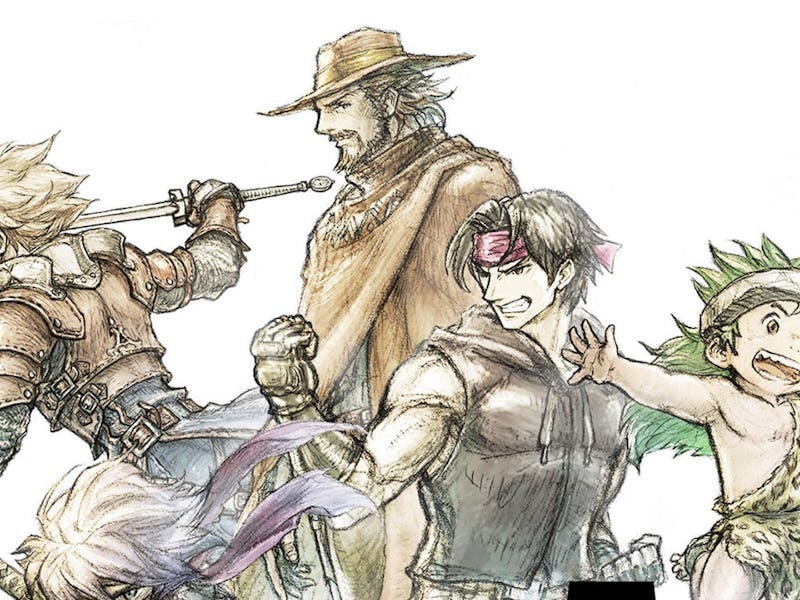6 wild facts about Live A Live, Square's obscure RPG gem
A lasting legacy lived in obscurity

The first Nintendo Direct of 2022 was full of surprise announcements, especially for fans of obscure ‘90s RPGs. In a move no one expected, Nintendo and Square Enix announced an HD-2D remake of Live A Live, a cult classic Japanese RPG that was released on the Super Famicom in 1994. It follows seven distinct protagonists across different time periods as they contend with a recurring antagonist. Since the game never received an official localization in the west, it’s fairly obscure. Yet it remains one of the most influential JRPGs of the last 30 years. With the Nintendo Switch remake launching on July 22, 2022, here are six wild facts that you probably didn’t know about Live A Live.
6. It did the Octopath Traveler formula first
Octopath Traveler draws heavy inspiration from Live A Live and even has the same number of main characters.
Live A Live had a profound effect on the RPG genre, especially in terms of its experimental story that weaved together the story of eight different protagonists across time. From a caveman named Pogo to a maintenance robot named Cube, these scenarios are set in the same world but span centuries. Just like with Octopath Traveler, you can play through the storylines in any order, but everything comes together in the final scenario. Live A Live was very much the first RPG to try this kind of storytelling and works as a precursor to titles that have interweaving storylines, like Kingdom Hearts: Birth By Sleep.
Where Live A Live differs from something like Octopath Traveler, is the variation put into each scenario. The whole game uses a turn-based combat system, but each character has their own unique twist put on gameplay. For example, the feudal Japan scenario is largely stealth-based, while the near-future scenario gives you the ability to read people’s minds to learn the info you need to progress.
5. Different artists designed each main character
Each of Live A Live’s main characters was designed by a different manga artist.
Something that makes each character even more unique in Live A Live is the fact that they were all designed by different manga artists. This makes each time period and story feel unique, as they all cater to a different visual style. There are some major manga artists that were involved as well, including the likes of Gosho Aoyama, the creator of Detective Conan, and Ryoji Minagawa, an artist on Spriggan.
The remake looks like it’s going for a more unified art style with the HD-2D engine, but you can still see the variation from the various artists lying underneath.
4. Live A Live’s director went on to direct Chrono Trigger and Parasite Eve
Chrono Trigger was released roughly one year after Live A Live.
Development of Live A Live was handled by Development Division 5 of Square, which was best known as the creators of Final Fantasy. One of the key members of the team was Takashi Tokita, the lead gameplay designer and scenario writer of Final Fantasy IV.
Live A Live was Tokita’s first time as a game director for Square, but it wouldn’t be the last. He went on to direct some of the most beloved RPGs of the PS1 era, including Chrono Trigger and Parasite Eve. Even later down the line, he’d go onto direct Final Fantasy: The 4 Heroes of Light, which inspired the Bravely Default franchise. Live A Live is a fascinating look at the start of one of the most prolific directors in the genre.
3. It was Yoko Shimomura’s first large project after joining Square
Yoko Shimomura has become one of the most prolific composers in video games, working on other titles like Xenoblade Chronicles, Mario & Luigi, Radiant Historia, and Legend of Mana.
Takashi Tokita wasn’t the only notable person that got their start with Live A Live, as it was also the first big project the legendary composer Yoko Shimomura would work on for Square. If you’re unfamiliar, Shimomura is best known as the main composer of the Kingdom Hearts series, as well as Final Fantasy XV and Super Mario RPG.
Live A Live was the first big RPG project Shimomura ever worked on, although she did contribute on other projects like Breath of Fire and Code Name: Viper. She was the sole composer of the game, and some of her most underrated tracks are present in Live A Live, like “The bird flies in the sky, the fish swims in the water.”
2. Live A Live inspired Toby Fox, creator of Undertale
Undertale takes a lot of inspiration from Live A Live.
Following the announcement of the remake, Undertale creator Toby Fox shared an interesting tidbit on how Live A Live inspired him.
The iconic song “Megalovania” from Undertale was apparently named after the boss track “Megalomania” from Live A Live, and you can definitely hear some similarities between the two. It’s the perfect example of the lasting influence of Live A Live, in ways most people might not even know about.
1. Live A Live was a commercial failure
Live A Live was re-released on the Wii U Virtual Console in Japan in 2015.
Despite its cult classic status Live A Live, sadly, was a pretty massive commercial failure. The game reportedly only sold around 270,000 copies in its lifetime, which was a dismal failure even by the standards of 1994. The game’s short length and low difficulty level likely had a hand in that, but it’s slowly built up a dedicated following over the decades. Those low sales numbers are partially what makes the remake so surprising, but it does present a chance to breathe new life into one of the most criminally overlooked games of the 1990s.